Today, senior RSG contributor Christian Perea digs into a new rideshare company called Tryp that has seen a ton of hype, but the company is also raising more questions than answers. Is Tryp legit?
Over the past several weeks we’ve gotten a lot of questions from drivers about a new rideshare company called Tryp. Readers, ambassadors for the company and others have messaged us claiming that Tryp is prepared to do BIG things that will shake the very foundation of the entire gig-economy. Then they invite us to attend an informational webinar.
What is Tryp?
Tryp rideshare says that drivers will get to keep 100% of their fares, choose their rides, earn money in perpetuity from passenger and driver referrals, become rich, and get paid today because of the blockchain. Tryp claims this will be made possible with a crack team of experienced employees, all lead by a visionary CEO with extensive entrepreneurial experience. He even sold Shopping.com for $220 million back in the good ol’ 90’s!
All it will cost drivers is $199 a month and you can even spring for the $399 option that makes you a driver-influencer. Whatever that is. If you couldn’t tell by now, I’m highly skeptical of Tryp but first, let’s go over the facts:
Tryp is a Multi Level Marketing (MLM) company run by a team of people with a history in running MLM’s. There is presently no rideshare app, no license to operate a TNC, no passengers and no insurance – all of which are required to run a transportation network company.
99.6% Of People Who Sign Up For An MLM Will Lose Money – Federal Trade Commission
A recent FTC study across more than 350 different multilevel marketing companies found that more than 99% of those who signed up for a Multi-Level Marketing (MLM) company lost money and more than half quit within the year they started. The study found that the vast majority of claims made by the 350+ multi level marketing companies in the US were grossly misrepresented.
Tryp began accepting payment on 12/19/2018 for their “driver” and “influencer” program. Payment of the $199 fee presently will only allow you to recruit other drivers and receive credit for doing so. However, there is still no evidence of an actual rideshare app or any of the infrastructure that goes with. There is only a web portal for recruiting more people to pay Tryp.
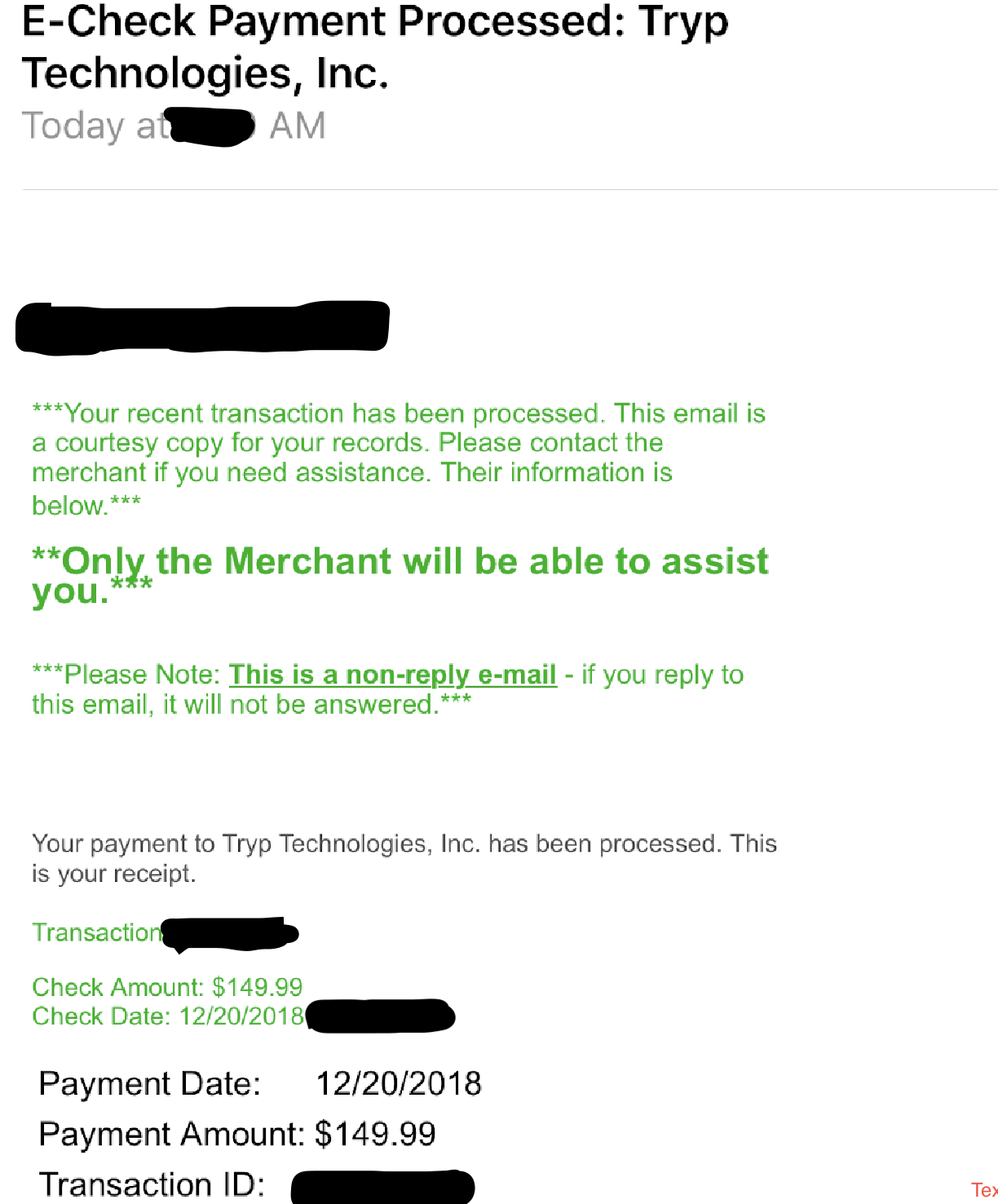
The Rideshare Guy, myself, and most sensible people do not recommend ever paying a monthly fee to be part of a rideshare company with no app or passengers. If you have paid them, let us know.
Tryp Rideshare Has ZERO Product
Tryp does not have an app yet and as of right now their presentation actually includes photoshopped images of the Uber app.
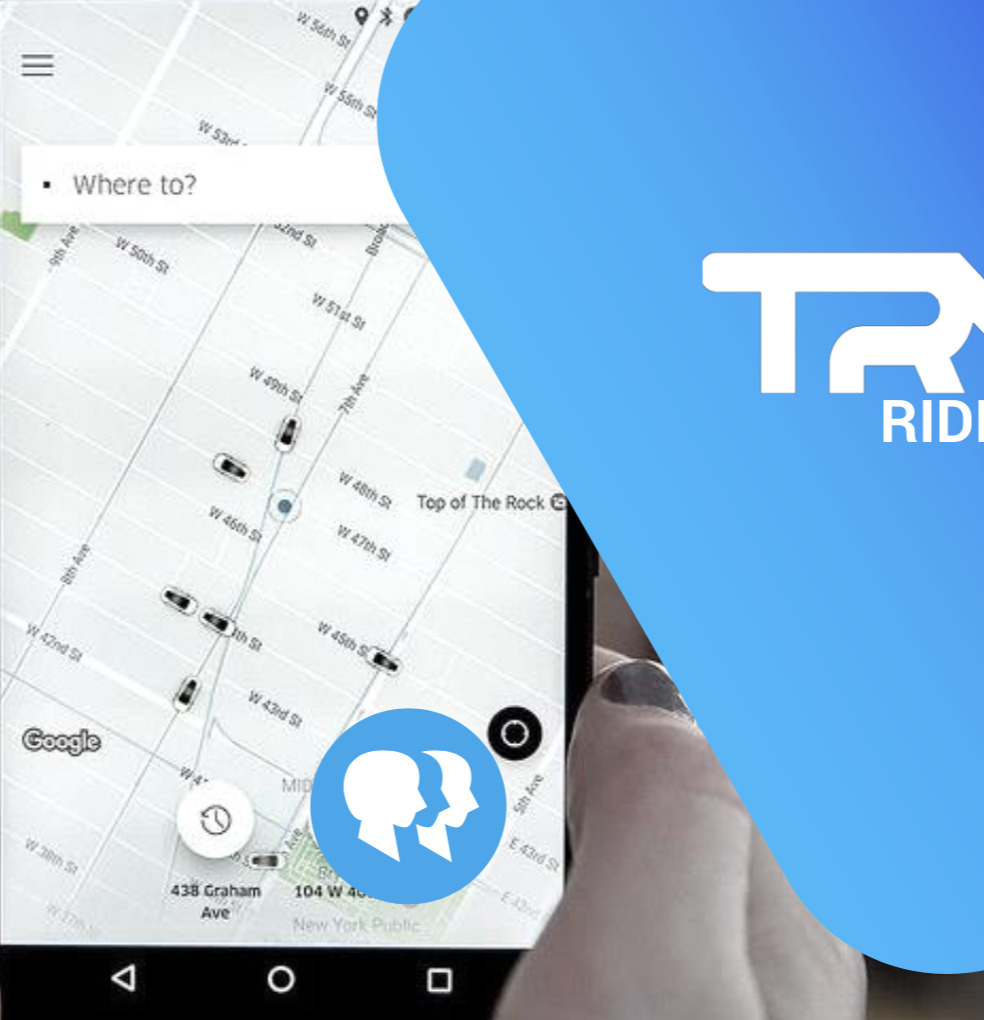
More importantly, The California Public Utilities Commission has not issued a TNC permit to Tryp nor included any trade dress for identifying a Tryp vehicle. Both are California laws that were created in the wake of Uber and Lyft earlier this decade.
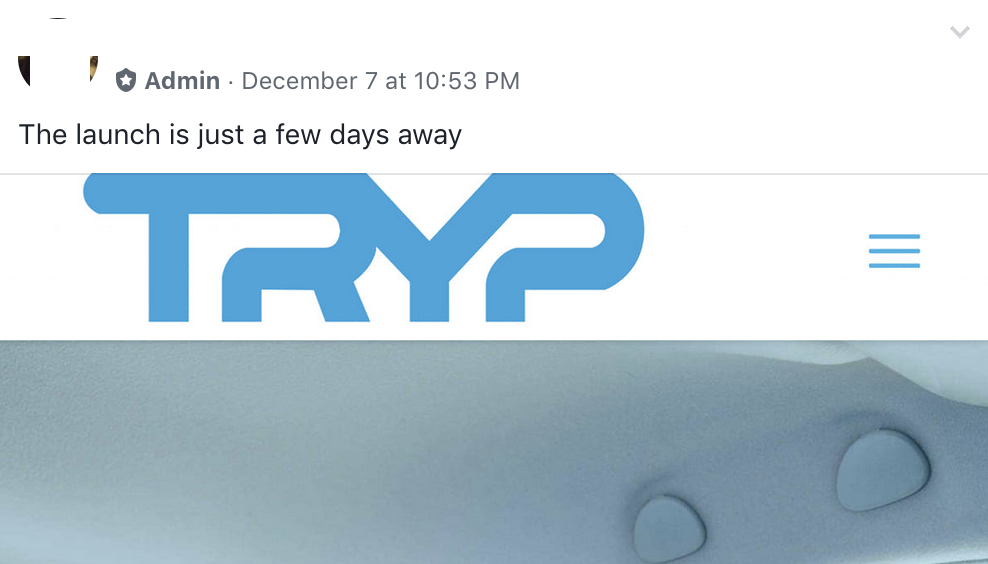
The admin of a Tryp drivers facebook group says the launch is a few days away on December 7th. At this time, Tryp has not launched an app. However, they have started to collect payment from would-be drivers and rolled-out basic recruitment software to track driver “leads” who may be willing to pay the $199 per month; despite having no rideshare app, passengers, or insurance.
A look around Tryp showed a lot of confusion as to when Tryp will launch their rideshare app. Some of their marketing material still says they are pre-launching in 2 weeks (from November). A presenter recently said an app was going to launch this week, and a company representative told us that Tryp intends to launch sometime in early January, and only in Los Angeles and Orange counties in California.
Remember, when Juno launched their app, they took months to research and test their app with drivers before even giving their first ride. This created a ton of buzz among drivers and it was one of the very first ways we even heard about Juno. There has been no such noise of rideshare app testing with Tryp.
Real MLM Companies Are Required To Have A Product
In the past, MLM’s have relied on flying into towns and renting event spaces at chain hotels near airports in middle America to sell you their schemes. They were forced to have an actual product that is vaguely useful due to a 1979 Federal Trade Commission decision on a case that allowed Amway to continue to operate because they had a product to sell.
In addition to having no app (and therefore no product), Tryp’s methods are different from legal MLM’s. This raises red flags for me beyond being a typical MLM because they can essentially disappear with my money and vanish into the ether of the Internet. It also moves them farther away from the category of legal multilevel marketing and closer to illegal pyramid scheme.
Tryp Is Trying To Recruit Drivers Throughout The US
Tryp has communicated with us that they intend to launch sometime “within the next two weeks” in Orange County and Los Angeles in California. However, they have been heavily recruiting drivers in places like Atlanta, New Orleans, and any part of the country they can get a hold of.
One person within Tryp’s Facebook Group even said he flew to Minneapolis to recruit there for a few days:
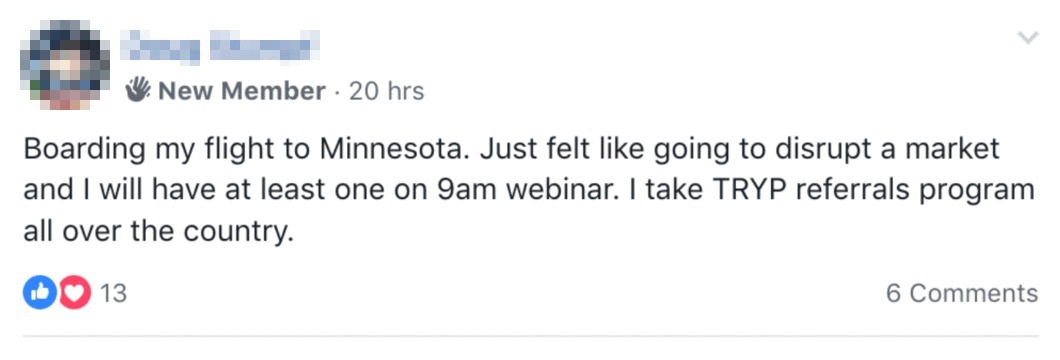
Tryp’s Presentation: High On Promises. Hazy On Details
Since Harry got so many invites, we decided to attend one of these presentations and record it for our notes. I quickly found a link that connected me to one of the 4 daily Zoom video conferences that Tryp gives to eager rideshare drivers seeking to learn more.
The presentation itself lasts about an hour and a half and is very similar to the type of MLM presentation you would see from Vector Marketing (Cutco knives) or Herbalife, albeit modified to capitalize on the wonders of the modern internet.
What’s more, the presentation focuses heavily on recruiting other drivers. There is very little mention of any rideshare-related details. As the Rideshare Professor points out, as of this writing there is no brick and mortar HQ, no offices, no downloadable apps, nor any proof of licenses. You can check out his thoughts on Tryp here.
Rideshare Businesses are Tough
We’ve interviewed CEOs of rideshare companies like Ride Austin and studied new entrants like Juno and one common theme is that the rideshare business is very tough and very expensive. Juno only gained market share because they were funded with millions of dollars and were able to subsidize rides – but as of July 31, 2018 they were doing around 33,000 trips per day, compared to Uber’s 453,000 trips per day. So despite all that effort, they were completely dominated by Uber and even Lyft in just one city. And that makes sense – Juno is now out of business.
Tryp’s emergence should prove that it’s easy to get drivers to sign up with a company but getting passengers is where the real companies separate themselves from the others. There’s a reason why most drivers prefer driving for Lyft over Uber yet they still do most of their rides with Uber – it’s because Uber is where the passengers are and thus the money is.
The Cult-Like Charisma Of MLM Companies
A recent article by Caroline Thompson interviewed an expert in deprogramming cult members and compared it to the process of deprogramming people who have gotten involved with MLM’s. According to him, multi-level marketing companies tend to have 3 common characteristics that are similar to being in a cult. They are:
- A charismatic leader who is revered and worshiped;
- A culture of coercive persuasion or thought reform, in which all members of the group are taught to think alike and isolate themselves from anyone who questions their devotion;
- Economic or other exploitation of group members by group leaders.
If you watch Tryp’s presentation above, it essentially spends an hour and a half working on those three points. Let’s go over them.
Tryp’s CEO Has A History of Running MLM Schemes
1) A charismatic leader who is revered and worshiped
Tryp’s branding and marketing heavily feature their founder and CEO, Robert McNulty. Showcased on a slide as a time-tested executive who sold Shopping.com to Compaq in 1999 for $220 million dollars. Also he has a video game stats bar?
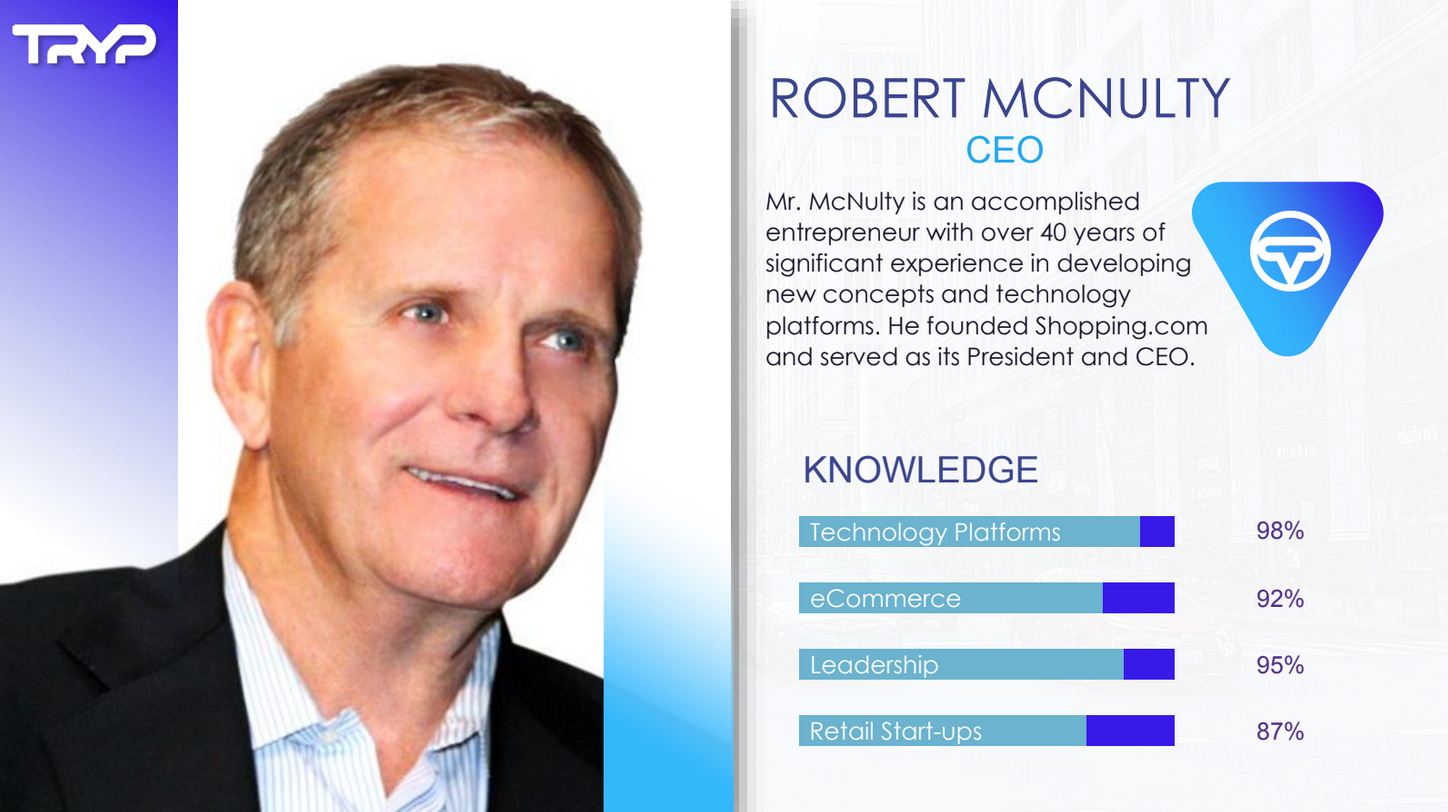
Founder worship is a core pillar of building any MLM, and companies like Tryp seem more than happy to play on a late startup culture that has emphasised the cult of the founder. With Tryp, this is modified to convince eager working-class rideshare drivers to pay $199 a month.
The following is an extremely abridged history of what I found on past companies lead by McNulty:
In 1998 McNulty resigned his position as CEO at Shopping.com due to an SEC investigation into stock price manipulation. The investigation was serious enough to stop trading of Shopping.com stock for 2 weeks. After McNulty resigned from Shopping.com as CEO, he was hired back two weeks later as a consultant and received a pay raise of $83,000.
In 2000, while still acting as a consultant at Shopping.com, he started a new company called TheBigStore.com that went bust five months after launching, creating $4.2 million in lawsuits from advertisers in the process.
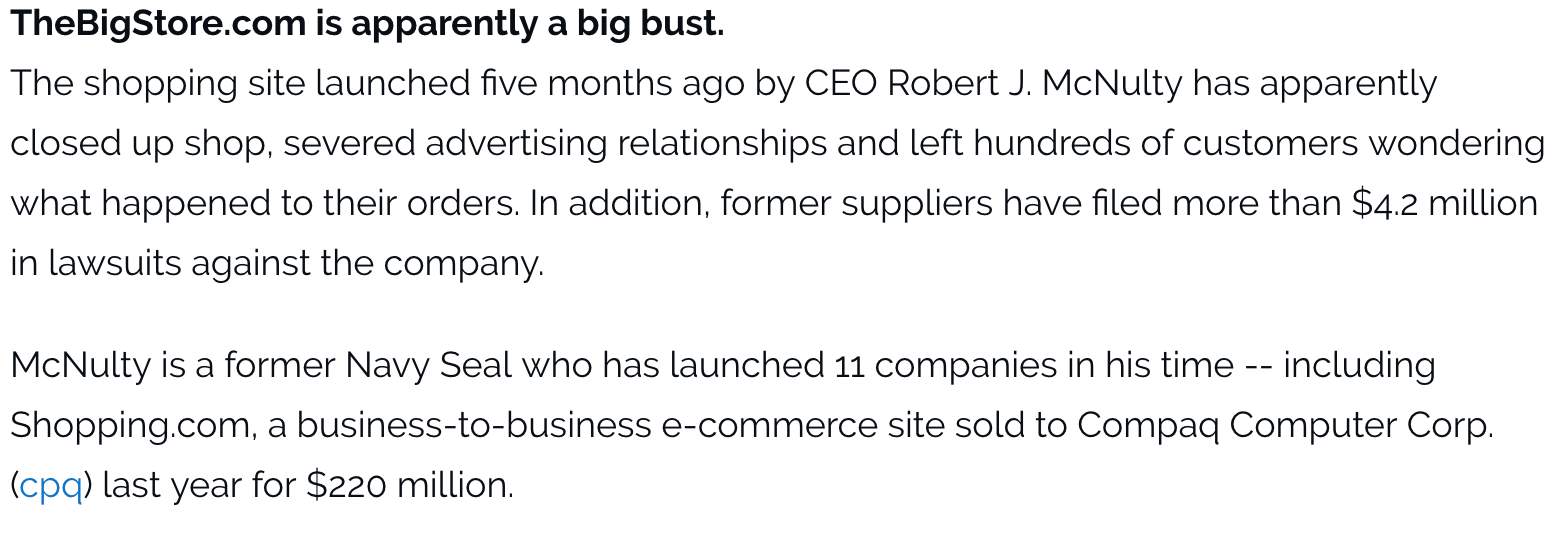
In 2011, McNulty was leading a new MLM venture called Kaching-Kaching, an e-commerce multi level marketing company. Here’s how that went for this guy.
McNulty is presently the CEO of at least two other companies, ibuyrite.com (another MLM scheme) and SupplyBloc, a supposed “blockchain” multilevel marketing company sharing several of the same executives, founders, and advisors as Tryp.
SupplyBloc paused their Initial Coin Offering (ICO) in March of 2018 and announced they were instead going to do a Security Token Offering (STO).
Back In 1995, McNulty settled a case with the SEC for $70,000 which charged that he had raised $78 million through various public and private offerings of securities and then diverted those money’s into other unrelated entities he controlled:

There’s a lot more to list and someone could probably do a whole article on this guy. Which is probably why someone started this blog back in 2010 purely devoted to Robert J McNulty.
“We’re A Family and You Wouldn’t Hurt Your Family Right?”
2. A culture of coercive persuasion or thought reform, in which all members of the group are taught to think alike and isolate themselves from anyone who questions their devotion
One thing that stood out to me from one of the presentations I attended (but failed to record) was the emphasis on NOT SHARING things about Tryp to social media via posts in public feeds or groups. According to the presenter, Tryp was only to be discussed among close friends of Tryp, in their DM’s or via email.
The presenter went further and asserted that “hurting the Tryp family could get you kicked out of Tryp. You’ll miss out on this opportunity of a lifetime and you will hurt your kids, your wife, your husband by not being able to provide a wealthy future for them. Tryp is just like your family too because we’re gonna help you get there. You wouldn’t hurt your family right?”
That sounds a lot like #2 in our cult test.
Tryp’s Trapezoid-Shaped Compensation Plan
3. Economic or other exploitation of group members by group leaders.
Each blue dot represents a driver this person referred, or another driver referred by one of the first three drivers
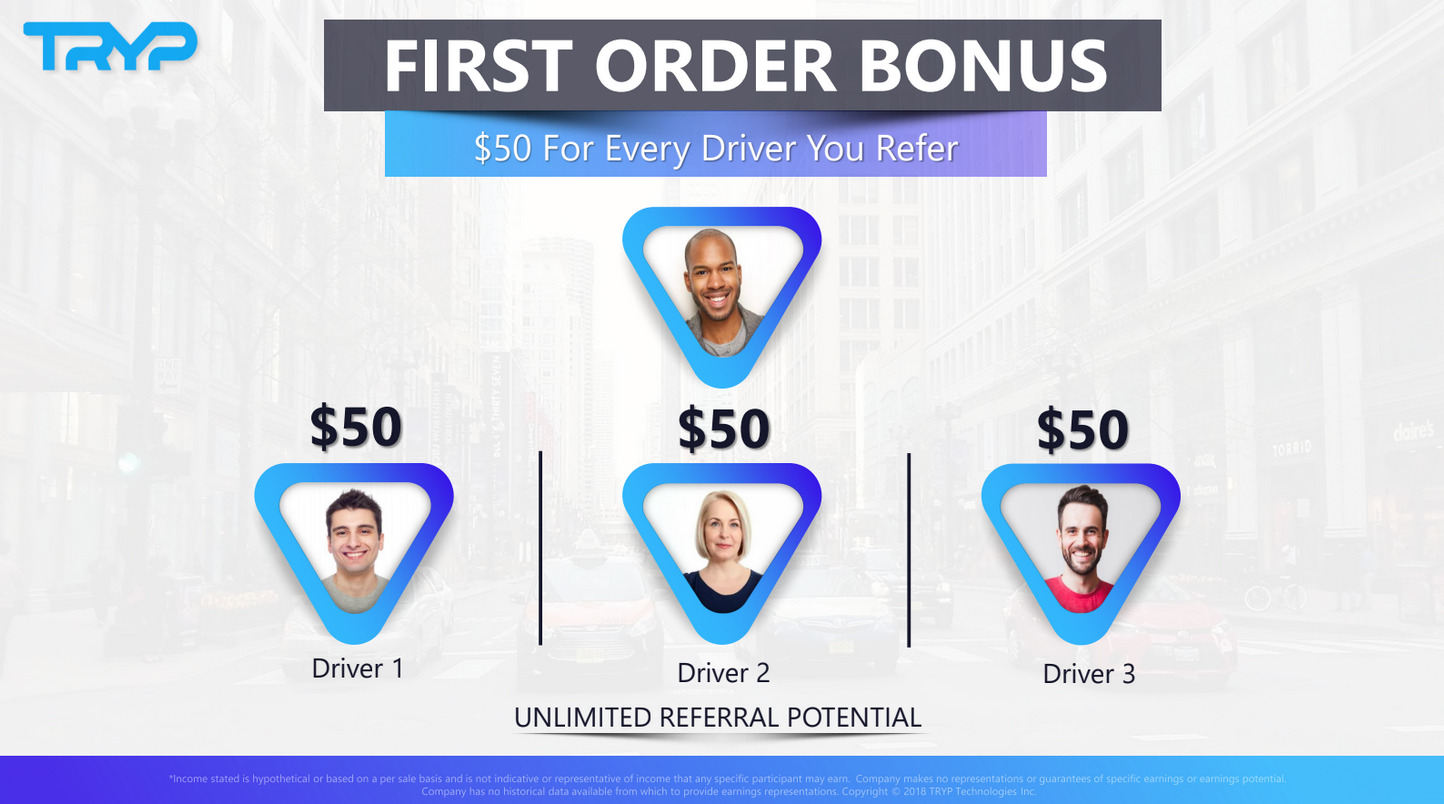
MLM companies are famous for claiming that these schemes have unlimited earning potential.

And lastly, I leave you with their logo. Which is definitely not an upside down pyramid.

Why Does This Appeal To So Many Rideshare Drivers?
It’s no secret that many rideshare drivers are unhappy with the way they have been treated in the gig-economy.
It’s easy to prey on that sentiment by offering a quick solution that appears to offer drivers a path to solving all of their problems. This is why it’s no coincidence that Tryp is offering to give drivers everything they’ve ever wanted with few details on how.
Prime Leads: We are already “entrepreneurs” that have taken a leap of faith and demonstrated a willingness to invest our own money in something. We have taken the initial risk to even start driving for Uber and some of us are even comfortable being independent contractors. We even have experience referring people to drive for Uber for a bonus.
Rideshare drivers are just the type of people an MLM company would want to recruit!
What About Companies Like Bounce?
Earlier this year we wrote about Bounce, an rideshare company in San Diego.
Bounce has some MLM elements in their recruiting programs, but they have an app with things like passengers, rideshare insurance, TNC placards, and above all, they do not require you to pay a monthly fee to have access to the app or to recruit others.
Should You Sign Up for Tryp?
You’re free to do whatever you want to do, but this is not a company that Harry or myself will be signing up for or supporting. There are too many red flags and there’s no way this company will ever compete with the likes of Uber and Lyft.
Our biggest issue with Tryp is all the hype they’ve surrounded themselves with. As it stands now, there are a whole lot of drivers that are going to be disappointed.
What Should You Do If You’ve Signed Up with an MLM Already?
First, if you believe you have been the victim of an MLM company you can file a complaint with the Federal Trade Commission using this link.
1) Don’t beat yourself up too bad – plenty of people sign up for MLM companies.
2) Don’t give them any more money, and if you have paid them anything please,
3) Don’t recruit your friends and family
If you have given any money to Tryp, please send us proof via text to (202) 810-4668.
Readers, do you have any experience with Tryp? Let us know in the comments.
-Christian @ RSG
Updated 12/20/18: Updated post to reflect that Tryp has begun to accept payment from drivers and has launched basic recruitment infrastructure to begin their network recruiting campaign.





